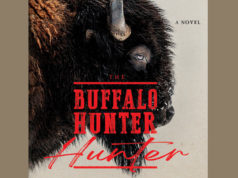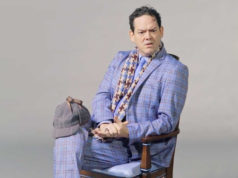Doug J. Swanson’s new book is laugh-out-loud funny — odd, since it’s about a semi-illiterate gangster who left a trail of dead bodies from Dallas to Las Vegas. But Benny Binion was in many ways a true visionary, even if his methods and materials were far from ethical.
Benny understood the dark recesses of human nature and played that knowledge masterfully. From his beginnings in bootlegging to running numbers to partnership in the elegant and legendary Top O’Hill Terrace in Arlington, he wheeled, dealed, befriended the rich and powerful, paid off authorities, and made money. Top O’Hill, reputedly the finest casino in the Southwest, attracted entertainers and millionaires to its gaming tables, restaurant, and brothel. “The whores were gorgeous,” Swanson writes, “almost as lovely as the movie stars leaning on the roulette tables. Some wore black velvet capes from Neiman Marcus.”
Swanson is masterful at creating scenes like that. He’s had practice, as the author of five crime novels, one of which was a finalist for the Edgar Award (like the Man Booker Prize for mysteries). He’s also been a finalist for the Pulitzer Prize in feature writing as an investigative reporter for The Dallas Morning News. And he does a bang-up job with this book.
The extent of political corruption in both Texas and Nevada was staggering. Dallas county sheriffs, district attorneys, and cops on the beat fell under Benny’s friendly spell. His flagrant crimes were glossed over. His political contributions were appreciated, and favors were reciprocated.
But eventually a new sheriff was elected, who refused to wink at Benny’s misconduct. And Benny’s archrival, gambler Herbert Noble, kept miraculously surviving numerous attempts on his life. The mob moved into Benny’s territory. So he set his sights on Las Vegas.
Benny continued his programs of good-ol’-boy friendliness and political benevolence in Nevada, counting gangsters among his best buddies. He described the notorious Bugsy Siegel as the “most accommodating, most likable fellow, had the best personality you ever seen” and one “Ice Pick Willie” (just imagine) as “the nicest, kindest-hearted man,” leading Swanson to remark, “This was typical of Binion, who functioned as a sort of Will Rogers of mobsters.”
Benny greased a few palms and feigned some paperwork and bought his own casino, The Horseshoe. And the money kept coming in. One of the Binion empire’s lawyers said, “Their money management system is simple: Just pile cash on the floor until the pile gets too big, then start another one.”
Benny got another bright idea: Invite two skilled high-stakes poker players to the casino for a marathon session. Up until this time, poker games were private matters, with no one in attendance but the players themselves. But Benny thought poker could become a spectator sport. He brought in Nick “The Greek” Dandalos, an aristocratic dandy who loved women and poetry. Benny described him as “a kinky ol’ guy. He’d put a snake in your pocket and ask you for a match.” To play against Dandalos, Benny invited his old pal Johnny Moss, who, like Benny, had dropped out of school in the early grades. Dandalos and Moss were opposites in almost every way, but they were among the top poker players in the country.
Legend tells us that this match lasted for five months and that Moss walked away with $3 million. Of course, details are sketchy. But the phenomenon that would come to be known as the World Series of Poker had just been introduced.
Benny usually stayed just a few steps ahead of the law, handing out money and skipping merrily away. He knew the ins and outs of Las Vegas and counted Nevada state officials among his dearest friends. Swanson vividly describes the glamour and the grit of that milieu, including the arrival of the crazed Howard Hughes, who brought corporate ownership to the town. He and Benny had known each other earlier in Dallas, but they probably never crossed paths in Vegas. Hughes was by this time deep in paranoid isolation.
Unlike many of his peers, Benny was a straight arrow in the realm of family life. No reports ever surfaced of dalliances with women. He remained loyal to wife Teddie Jane (who was 16 at the time of their marriage) and the children. He provided necessities and luxuries and tried to make it home for dinner. Despite the dangers of his lifestyle, Benny lived a good long life, dying of heart failure at 85 on Christmas Day in 1989 in Las Vegas.
Seems that everybody knew Benny. Everyone liked Benny. And it was reciprocal. “The only people I don’t like,” he’s quoted as saying, “is the ones that try to snatch my money away.” Billy Bob Barnett even placed a massive bronze and granite statue of his good friend on horseback outside his namesake honkytonk in Fort Worth. Names of famous people who knew and liked Benny Binion pop up like weeds on the pages of this highly readable biography. He wasn’t a nice guy at all, but he remains a legend.












